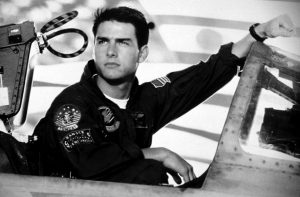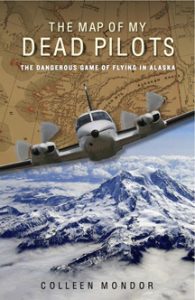SR: Your bio says you learned to fly at 18. What got you excited about flying in the first place, and how did you go about learning to do it?Â
CM: I learned to fly as part of my first degree, which is in Aviation Management. My stepfather was a pilot & he really wanted me to fly and I graduated in 1986 when Top Gun was the biggest movie in the world and flying seemed like a good idea to me, (and a way to meet boys) so I obtained my private pilot license as two elective courses my freshman year.

SR: When you worked for the Company, did you ever want to be one of the pilots?
CM:Â The reason I never tried to fly professionally is that it was not easy for me. I was a competent pilot but “behind” the airplane. That’s not a problem when things are going fine but if you are in trouble you need to be ahead of the airplane; you need to be anticipating what will happen next. I think knowing how to fly is essential for people in the aviation field (it has helped me in countless ways) but I never wanted to do it professionally; I know my limits.
SR: I was really struck by the way you shift the voice from a collective “We” to an “I” to a more neutral journalistic tone in different sections of the book. How did you decide on this approach to the narrative?
CM:Â I wish I could say the shift in voice was easy but it’s actually something I worked on a lot and my agent and editor helped me with. The journalistic sections were easiest as I really was conducting standard historical research when I wrote those passages but it was harder to maintain balance between “we” and “I” in the narrative. At first I was too much a part of the story and then I was too little. Finding the balance was something I worked on until the end; this was where the writing really got tough.
SR: I wondered a lot as I read about gender dynamics in the Company. It seemed like the pilots were almost entirely male — were there women in other departments, or were you more or less on your own? How did you make a place for yourself in the organizational culture? (I’ve been the one-girl-among-the-guys at various times in my life and I’m always curious about how other women negotiate it.)
CM:Â There were other women in the office (accounting mostly) but we made up only about 10% of the employees. There was one female pilot at the Company; I knew of less than a dozen who flew statewide while I was there. (The reason I made all the pilots at the Company males in the book was to protect her – a female pronoun would have made it obvious who I was writing about.)
I never was belittled because I was female and I made the best friends of my life at the Company but I did have to get tougher, both physically and mentally. I loaded airplanes to gain respect from the cargo guys, I stood up to more than one jerk (mostly passengers) who was threatening and I learned to be assertive. The biggest thing was being willing to work – to get out on the ramp and deal with the mail and talk to the mechanics and sort the baggage and on and on.
It’s a job where everyone had to work hard; in the past women in my position had claimed they couldn’t do some of the work because they were girls. I wanted to be respected on every level so I did the work and showed that it didn’t matter if you were a girl. That’s a big part of why I was so successful.
SR:Â I also wondered about the Bosses and the Owners. When you were in the process of writing this book, did you try to interview any of them? (Or did you even want to?)
CM:Â Part of why I referred to the owners and bosses by such general names is because they are basically the same at every small airline in Alaska. They all do the same thing, say the same thing and cause the same problems. I wanted them to be interchangeable (much as the “company” stands in for all airlines up there as well.) I didn’t talk to the specific ones from the Company when writing the book though – I already know what they think and I’m sure their version of events will never be the same as mine. (Some things never change!)
SR: And of course, the ever-popular question: What are you working on now?
CM: You know, I’m working on several different things right now because I’m still a bit overwhelmed by what I have to do to help market MAP. I’m just not up to a big project right now. (I don’t have the organizational time for it mostly.) I’m primarily working on two essays – one about Jack Kerouac and my French Canadian family and one about the mystery surrounding my great grandfather’s grave on my NYC Irish side. I am sure that the next big project will be another combination of history and memoir – it’s what I seem to be best at writing.
SR: Thanks so much, Colleen — I’m looking forward to whatever’s next from you!

